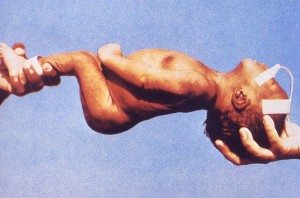The current tragedy in Haiti may turn out to be one of the worst natural disasters (if not the worst) the Western Hemisphere has seen in the post-colonial era. Immediate deaths caused directly by trauma from the quake itself will likely number in the tens of thousands but we can be pretty sure that there’s more horror to come. This is a tragedy which is going to continue for months—probably years—to come. Science-based medicine has taught us much about how to mitigate disasters such as this one. Unfortunately, in Haiti medicine is only part of the problem; the long-standing political and economic problems have helped limit what medicine can do. But even in the most troubled of countries, attitudes toward science-based medicine can have profound effects on the health of the population. We in the U.S. still wield an enormous power over health policy in other countries. We have managed to insert our religious ideologies into other nations’ HIV prevention and treatment strategies via foreign aid policies. American individuals, such as HIV-denialist Peter Duesberg, have influenced foreign leaders in making disastrous health policy decisions. When the South African government bought into AIDS denialism, tens to hundreds of thousands died. The anti-vaccination movement has the potential to cause much more damage (and by “damage” I mean death and suffering). If the anti-vaccination crowd increases their influence, they can not only injure more Americans, but also those in other countries who are already suffering quite enough.  One of the coming tragedies in Haiti will be widespread illness and death from vaccine-preventable diseases. A terrifying example is tetanus. Tetanus is a disease caused by the bacterium Clostridium tetani. These bacteria live in most soils, especially rich soils, and can easily infect small wounds. Once the infection takes hold, the bacteria produce a potent toxin responsible for most of the symptoms of the disease. These symptoms include horrifying muscle spasms, including jaw spasms which give the disease its other name, “lock-jaw”. And it is a horrifying disease, affecting adults with even minor wounds, and babies, who can become infected at the site of their umbilical cord. The disease is frightening, causing uncontrollable muscle spasms resulting in death in nearly 100% of untreated cases. Even when treated, tetanus has a very high mortality rate, and given that tetanus tends to be more common in areas with less access to treatment, the impact is doubly felt. Neonatal tetanus is a dreadful disease, doubly so because it is so easily prevented. When mothers are vaccinated neonates are protected by passage of antibodies to the fetus in utero. Due mainly to political and economic conditions, tetanus vaccination rates in Haiti are low (about 50% in children). Previous similar disasters, such as the Kashmir earthquake and the Indian Ocean tsunami have showed us that tetanus is a special problem after natural disasters.
One of the coming tragedies in Haiti will be widespread illness and death from vaccine-preventable diseases. A terrifying example is tetanus. Tetanus is a disease caused by the bacterium Clostridium tetani. These bacteria live in most soils, especially rich soils, and can easily infect small wounds. Once the infection takes hold, the bacteria produce a potent toxin responsible for most of the symptoms of the disease. These symptoms include horrifying muscle spasms, including jaw spasms which give the disease its other name, “lock-jaw”. And it is a horrifying disease, affecting adults with even minor wounds, and babies, who can become infected at the site of their umbilical cord. The disease is frightening, causing uncontrollable muscle spasms resulting in death in nearly 100% of untreated cases. Even when treated, tetanus has a very high mortality rate, and given that tetanus tends to be more common in areas with less access to treatment, the impact is doubly felt. Neonatal tetanus is a dreadful disease, doubly so because it is so easily prevented. When mothers are vaccinated neonates are protected by passage of antibodies to the fetus in utero. Due mainly to political and economic conditions, tetanus vaccination rates in Haiti are low (about 50% in children). Previous similar disasters, such as the Kashmir earthquake and the Indian Ocean tsunami have showed us that tetanus is a special problem after natural disasters.  In developed nations such as the U.S. and the U.K., anti-vaccine movements have caused outbreaks of vaccine-preventable diseases. If anti-vaccination activists succeed in influencing the policies of the U.S. and other governments—as other fringe health activists have done—they may become morally complicit in the deaths of thousands of Haitians. We must remain vigilant to protect our neighbors from our less knowledgeable citizens. Meanwhile, Haiti needs cash. There are many organizations that are already on the ground helping. Here is a brief list (one that is not in any way endorsed by SBM or it’s editors and writers other than myself):
In developed nations such as the U.S. and the U.K., anti-vaccine movements have caused outbreaks of vaccine-preventable diseases. If anti-vaccination activists succeed in influencing the policies of the U.S. and other governments—as other fringe health activists have done—they may become morally complicit in the deaths of thousands of Haitians. We must remain vigilant to protect our neighbors from our less knowledgeable citizens. Meanwhile, Haiti needs cash. There are many organizations that are already on the ground helping. Here is a brief list (one that is not in any way endorsed by SBM or it’s editors and writers other than myself):
Exploring issues and controversies in the relationship between science and medicine
